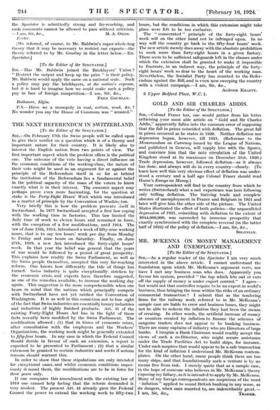THE NEXT REFERENDUM IN SWITZERLAND.
[To the Editor of the SPECTATOR.] SIR,—On February 17th the Swiss people will be called upon to give their verdict on a question which is of a thorny and important nature for their country. It is likely also to interest the English nation from two points of view. The first important aspect which the problem offers is the political one. The outcome of the vote having a direct influence on the economic conditions of the working-class, the nature of their vote might be used as an argument for or against the principle of the Referendum itself in so far as behind the institution of the Referendum lies a fundamental belief in the political sagacity of the mass of the voters to know exactly what is in their interest. The economic aspect may perhaps prove even more fascinating, for the question at stake is the Forty-Eight Hours' Week which was introduced as a matter of principle by the Convention of Washington.
Very briefly this is how the problem presents itself in Switzerland. In 1877 Switzerland accepted a first law coping with the working time in factories. This law limited the daily time of work to eleven hours and remained in force, with the exception of a few modifications, until 1914. The law of June 15th, 1914, introduced a week of fifty-nine working hours, that is to say ten hours' work per day from Monday to Friday and nine hours on Saturday. Finally, on June 27th, 1919, a new Act, introduced the forty-eight hours' week. In that year the belief was general that the years of war would be followed by a period of great prosperity. This explains how readily the Swiss Parliament, a s well as the Swiss people themselves, accepted this very far-reaching reform. One knows how differently the tide of things has turned. Swiss industry is quite exceptionally stricken by the economic crisis, and experts have therefore suggested, as one of the remedies available, to increase the working day again. This suggestion is the more comprehensible when one bears in mind that the nations which principally compete with Switzerland have not yet ratified the Convention of Washington. It is as well in this connexion not to lose sight of the fact that Swiss industries are essentially luxury industries and industries of highly finished products. Art. 41 of the existing Forty-Eight Hours Act has in the light of these facts recently been modified by the, Swiss Parliament. The modification allowed : (1) that in times of economic crises, after consultation with the employers and the _Workers' Organisations, the working week might be generally extended to fifty-four hours. In any case in which the Federal Council should decide in favour of such an extension, a report is expected to be presented to Parliament ; (2) that a similar extension be granted to certain industries and works if serious reasons should warrant this.
In order to show that these stipulations are only intended for exceptional cases, and whilst economic conditions imper- iously demand them, the modifications are to be in force for three years only.
If one compares this amendment with the existing law of 1919 one cannot help feeling that the reform demanded is very modest. The present Art. 41 already gave the Federal Council the' power to extend the working week to fifty-two
hours, but the conditions in which this extension might take place were felt to be too exclusive.
The " consecrated " principle of the forty-eight hours' week will on the other hand not be infringed upon. In no way will the country go back to the fifty-four hours' week. The new article merely does away with the absolute prohibition to work more than forty-eight hours in a given factory. There seem to be sufficient safeguards left in the clauses under which the extension shall be granted to make it impossible to frustrate, in an indirect way, the principle of the forty- eight hours' week so dear to the heart of the working man. Nevertheless, the Socialist Party has resorted to the Refer- endum against the Bill, and is even now sweeping the country with a violent campaign.—I am, Sir, &c.,
3 Upper Bedford Place, W.C. 1.
AWINOR KRAFFT.










































 Previous page
Previous page